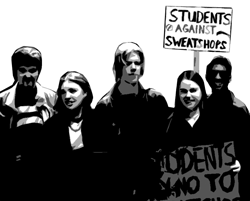WELCOME TO THE ARCHIVE (1994-2014) OF THE MAQUILA SOLIDARITY NETWORK. For current information on our ongoing work on the living wage, women's labour rights, freedom of association, corporate accountability and Bangladesh fire and safety, please visit our new website, launched in October, 2015: www.maquilasolidarity.org
 The first Canadian code governing "licensing" was passed at the University of Toronto in the spring of 2000. It sets minimum labour standards that manufacturers producing apparel bearing the U of T name or logo must meet. Since then another 12 Canadian universities have passed No Sweat licensing policies.
The first Canadian code governing "licensing" was passed at the University of Toronto in the spring of 2000. It sets minimum labour standards that manufacturers producing apparel bearing the U of T name or logo must meet. Since then another 12 Canadian universities have passed No Sweat licensing policies.
Universities have large bureaucracies and sometimes it's hard to pinpoint who's in charge of policies for "licensing" the use of the school's name. Some schools have a whole department or a director who takes care of licensing. Others leave it to someone in their fundraising department. Still others allow the bookstore manager to make those decisions.
Check your school's directory or ask the manager at the bookstore. There may already be a policy on licensing or bulk purchasing. Request a copy and ask how it can be reviewed and amended. Once you've found who's responsible for setting this policy, you'll know who to talk to about adopting an effective code of conduct.
Some schools will have Public Interest Research Groups (PIRGs) on campus, which have been very supportive of No Sweat campaigning. PIRG staff can help you set up a Students Against Sweatshops group at your school. Local OXFAM or WUSC groups may also want to get involved.
Most groups start out with a public forum on sweatshops, usually with a speaker and a video, and sometimes a Sweatshop Fashion Show. People who attend the forum will probably be interested in joining your group.
Researching who makes school clothing and the countries where it's made is essential. Check the labels on clothing at your school bookstore, and write down the name of the company, the country of origin, and the "CA" number. Labels won't tell you everything you want to know - only through full public disclosure will we know exactly where things are made and under what conditions - but they will give you an idea of who's supplying goods to your school and the countries where they are made.
First and foremost you want the administration to pass a No Sweat code of conduct for licensed goods and bulk-purchased apparel such as staff and athletic uniforms. The strategies and focus of individual schools will depend on the amount of bulk-purchased versus licensed apparel and also what groups feel is within their reach. Achieving a code will no doubt take meetings, lobbying, long discussions and steady student pressure.